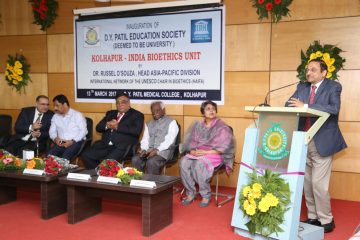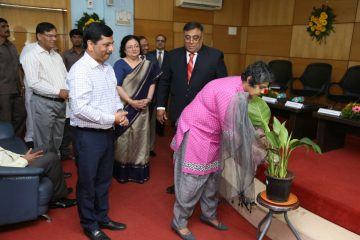

- The Unit is a part of the International Network of the UNESCO Chair in Bioethics (Haifa).
- Date of establishment: 25th October 2016
- Inaugurated on: 13th March 2017
BRIEF ABOUT BIOETHICS UNIT
- Name of the Unit: D Y Patil Education Society (Deemed to be University) Kolhapur-India Bioethics Unit.
- Description: The Unit is a part of the International Network of the UNESCO Chair in Bioethics (Haifa).
- Date of establishment: 25th October 2016
- Inaugurated on: 13th March 2017
Vision and Mission statement of the Bioethics unit
Vision:
The vision of UNESCO Chair in Bioethics of the D.Y. Patil Education Society, Deemed University, Kolhapur, Maharashtra is to promote & strengthen, amongst professionals, the application & knowledge of ethics in the spheres of academics, research, clinical practice and community service.
Mission:
- 1. Provide and strengthen updated and interactive education in principles and applications of bioethics in clinical practice and research.
- 2. To continuously modify, upgrade and maintain high standards in bioethics education.
“Nothing that you do in science is guaranteed to result in benefits for mankind. Any discovery, I believe, is morally neutral and it can be turned either to constructive ends or destructive ends. That’s not the fault of science.” ___ Dr Arthur Galston, Yale.
Aim:
The Aim of the Unit is to sensitize and educate health professionals about the importance of bioethics in day to day clinical practice and research.
Objectives of the UNESCO Bioethics Unit:
- 1. Upgrade emphasis on bioethics in existing curricula in medical and allied health sciences.
- 2. To develop a bioethics module to be covered during the academic course.
- 3. Incorporate discussions on bioethics during clinical rounds and case discussions.
- 4. Train existing and potential teachers for teaching bioethics through workshops, seminars and lectures.
- 5. Promote bio-ethical research through training, discussions and workshops.
Proposed activity framework of the unit:
- 1. Broaden the student’s base of bioethics through website, newsletter and journal.
- 2. Organizing seminars, CMEs, special courses and lectures on bioethics.
- 3. Conduct National, regional and International conferences.
- 4. Orientation and update workshops on bioethics for undergraduate and post graduate students.
- 5. To collaborate with Institutional bioethics units of different Universities, Forum for ethics review committee in India (FERCI), and International Colloquium.
- 6. Writing book and chapters.
- 7. Discussion forum on UNESCO’s bioethical values, books and documents.
- 8. Conducting research in the field of Bioethics.
Recommendation:
The task of this unit would be to offer on the ethical and social implications of scientific developments in human medicine and healthcare system. This would include:
- 1. Advisory committee will be created where experts would address and debate priority issues and their solutions, and provide reports based on ethical values and principles as requested as requested by the University.
- 2. Providing recommendations and assistance for the betterment of healthcare policy and bioethical values to our Institution.
- 3. Representing D.Y.P.E.S. Deemed University at international and national forums and conferences for bioethics and creating a wide collaboration to communicate and exchange information for the development of Bioethics in healthcare policy.
- 4. Conduction of regular meetings and proper documentations on bioethical aspects of clinical and research perspectives.
- 5. Research collaboration in special ethical issues like stem cell and regenerative medicine.
- 6. Targeted strategies to protect vulnerable population in health care.
Areas of research suggested:
- 1. Bioethics in medical education and practice.
- 2. Bioethics in research in human beings and animals.
- 3. Mental health research
- 4. Genetic and molecular research
- 5. Emergency medicine
- 6. Health system and its socio-economic and psychological impact on an individual.
- 7. Stem cell and regenerative medicine